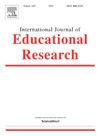The activist underpinnings of intercultural education may be more effective when the theories about the peripheries prioritize self-criticality in conceptualizing and implementing this pedagogy. This warrants examining how epistemic agency is exercised by educators to align the sociologies of intercultural education with the ecologies of their spaces. The aims of this paper are, (a) to unpack the cultural and epistemic formations of teachers’ understandings of the premises and objectives of intercultural education and (b) prompt southern epistemic subjects to produce knowledge about intercultural education that accounts for their epistemological positionalities and their consideration of local intimacies, needs and aspirations. This qualitative study uses email interviews with Moroccan EFL teachers to elicit their epistemic input rather than to situate their responses among mainstream literatures. Findings illuminated the complex epistemic processes that educators are engaged in to construct their situated knowledges informed by the intersection of available scholarships, their ontologies and contextual factors. Findings suggest that educators’ exercising of intercultural education is problematized by the lack of training which leads to ‘improvisation’ and the high-abstract rhetorics in literature which may require educators to sustain more efforts in addition to thorny attempt of doing intercultural education otherwise.


